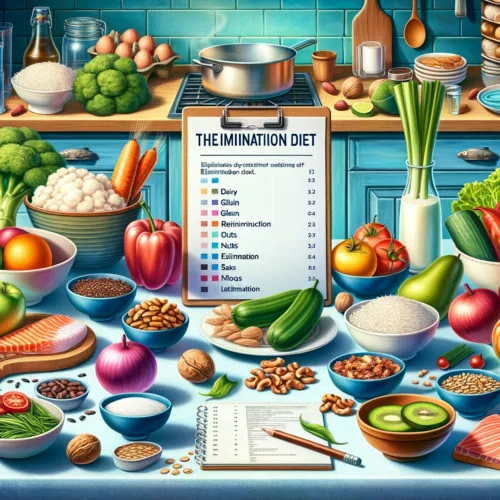Introduction
Gluten, a protein found in many cereal grains such as wheat, barley and rye, has become one of the most talked about ingredients in food in recent years. While some people are wary of it and consider it the cause of various problems, others see nothing harmful in it. In this article, we will delve into the myths and facts about gluten to get a more objective view of its health effects. We will explore different aspects of the link between gluten and health, as well as provide tips and advice for those who face problems related to gluten in food.
What is gluten and where is it found?

Gluten is a mixture of proteins that gives elasticity and structure to dough in food products. The main sources of gluten include wheat, barley and rye, and products made from these grains, such as breads, pastas, cookies and beer. Gluten gives products lushness and firmness, making them more appealing to consumers. However, not all grains contain gluten. For example, oats in their natural form are gluten-free, but can often be contaminated with gluten during production and processing.
History and evolution of gluten problems
Gluten-related problems have a long history that stretches back through the centuries. One of the most well-known and serious gluten-related diseases is celiac disease. This is an autoimmune disease in which the consumption of gluten causes inflammation in the intestines, resulting in damage to the intestinal walls. Celiac disease was first described in ancient medical texts more than 2,000 years ago.
However, in recent decades there has been an increase in the number of people who experience gluten intolerance or sensitivity but have not been diagnosed with celiac disease. This has led to the concept of “incomplete gluten sensitivity” or “gluten intolerance without celiac disease”. This may be due to changes in modern wheat varieties and production methods.
It is important to note that more research is needed to fully understand these issues and their evolution. Increasing our knowledge and understanding of gluten and its impact on health will help people make more informed decisions about their diet and health.
Myths about gluten and its health effects

Gluten and its effects on health have been the subject of many myths and unsubstantiated claims. Let’s take a look at some of them and see how true they are.
Myth 1: Gluten is bad for everyone
One of the most common myths about gluten is the claim that it is bad for all people. However, this is far from the truth. Gluten can only be problematic for those who have certain health conditions or sensitivities to it.
Celiac disease is the most serious disease associated with gluten. In people with celiac disease, gluten consumption leads to inflammation and damage to the small intestine. This autoimmune disease requires a strict gluten-free diet.
Gluten allergy and celiac disease
There is also a gluten allergy, which causes an immune system reaction. Gluten allergy can be caused by various proteins found in wheat, barley or rye.
Gluten intolerance and gluten sensitivity
Some people may experience gluten intolerance without having celiac disease or allergies. They may experience unpleasant symptoms such as abdominal bloating, gas, diarrhea or fatigue after consuming gluten. However, the exact causes and mechanisms of this intolerance are not fully understood.
It is important to note that for most people, gluten is safe and does not cause any problems. Unless you have been diagnosed with celiac disease, a gluten allergy, or obvious symptoms of intolerance, there is no need to eliminate gluten from your diet.
It is always advisable to contact your doctor or nutritionist if you have any doubts or concerns about gluten. They can do appropriate research and make recommendations based on your individual health and needs.
Myth 2: Getting rid of gluten helps you lose weight
Another common myth about gluten is the claim that eliminating gluten from your diet helps you lose weight and lose weight. However, this claim has no scientific basis.
Eliminating gluten from your diet can lead to weight loss, but this is usually not due to the gluten itself, but to changes in food choices and overall caloric intake. When people eliminate gluten from their diet, they often eliminate foods containing wheat, barley, and rye, such as bread, pasta, cookies, and other high-calorie foods. This can lead to lower calorie intake and therefore weight loss.
h4: The role of gluten in weight and the myth of weight loss
However, it is important to note that gluten alone is not a direct cause of weight gain. Weight gain or loss depends on the overall calorie balance in your diet and your level of physical activity. Unless you suffer from celiac disease, gluten allergy or gluten intolerance, there is no need to eliminate gluten from your diet for weight loss.
Instead of focusing on getting rid of gluten, it is recommended that you follow a healthy and balanced diet that includes a wide variety of foods. If you have a weight problem, consult a nutrition professional to develop a personalized meal plan tailored to your needs and goals.
Myth 3: Gluten causes digestive problems for everyone
Another common myth about gluten is the claim that it causes digestive problems in all people. However, this statement is incorrect.
Gluten-related digestive problems occur only in some people who have a diagnosis of celiac disease, gluten allergy, or gluten intolerance. Celiac disease is a chronic autoimmune disorder in which gluten causes inflammation and damage to the small intestine. A gluten allergy also causes a negative immune system response. People with celiac disease or gluten allergy should strictly eliminate gluten from their diet to avoid unpleasant symptoms and complications.
Digestive disorders and association with gluten
However, for most people, gluten is safe and does not cause digestive problems. Most people’s bodies are able to digest and absorb gluten without any adverse effects. Therefore, unless you have been diagnosed with celiac disease, a gluten allergy, or obvious symptoms of gluten intolerance, there is no need to eliminate gluten from your diet.
It is important to remember that every body is unique and the reaction to gluten may vary from person to person. If you have concerns or digestive problems after consuming gluten, it is recommended that you contact your doctor or nutritionist for appropriate research and professional advice.
Facts about gluten and its health effects

Gluten is a group of proteins found in wheat, barley and rye. Here are some facts about gluten and its health effects:
Fact 1: Gluten is safe for most people
Most people have no problem eating gluten and it is part of their normal diet.
Gluten contains proteins that the body normally digests well. It is also an important source of nutrients, including protein, fiber, iron, and B vitamins.
It is important to note that unless you have a diagnosis of celiac disease, gluten allergy or gluten intolerance, there is no need to avoid gluten. It will not affect your health or digestive system. If you have any questions or concerns about gluten, it is recommended that you consult your doctor or dietitian for individualized advice and nutritional guidance.
Normal gluten tolerance and its benefits
1. Nutrients: Gluten is a rich source of protein, which is essential for growth and tissue repair in the body. It also contains fiber, which helps the digestive system function properly. Gluten also contains B vitamins, iron, magnesium and other nutrients that can be beneficial for overall health.
2. Foods: Many foods containing gluten represent an important part of our daily diet. Breads, pastas, cereals, wheat products, and other gluten-containing foods offer a wide range of flavors, textures, and nutritional benefits. Eliminating gluten from your diet can be restrictive and make it difficult to diversify your food choices.
3. Psychological aspect: Eating foods that feel good is important for our psychological well-being. For many people, gluten-containing foods are part of their favorite foods and traditions. Eliminating gluten from the diet without a medical reason can cause feelings of restriction and negatively affect psychological well-being.
Fact 2: Gluten is not linked to autoimmune diseases
It is important to note that gluten is not the cause of autoimmune diseases. Autoimmune diseases such as rheumatoid arthritis, systemic lupus erythematosus, or Segeuren’s syndrome are caused by an inadequate response of the immune system when it begins to react against the body’s own tissues.
Although some autoimmune diseases may be associated with disorders of the digestive system, no studies support a direct link between gluten and the development of autoimmune diseases. Autoimmune diseases are due to complex mechanisms and multifactorial causes, including genetic predisposition, environment, and other factors.
However, some people with autoimmune diseases may benefit from eliminating gluten from their diet if they notice that it reduces symptoms or improves their overall condition. However, this is an individualized approach that requires consultation with a doctor or nutritionist.
It is important to note that gluten is not a common cause of autoimmune disease, and eliminating it from the diet is not a one-size-fits-all solution for all people with autoimmune disease. The decision to include or exclude gluten from the diet should be based on the specific needs and individual reactions of each person.
Research findings and lack of direct linkage
Many studies have been conducted to investigate the possible link between gluten and various diseases, including autoimmune diseases. However, most of these studies have not found a direct link between gluten and the development of autoimmune diseases in individuals without a diagnosis of celiac disease.
For example, a study published in JAMA Internal Medicine, conducted on more than 110,000 women over 26 years, found no association between gluten consumption and the risk of rheumatoid arthritis. Similar results have been reported in other studies conducted on larger groups of people.
These results confirm that there is no direct association between gluten and the development of autoimmune disease in most individuals. However, in some individual patients, an association between gluten intake and worsening symptoms of their autoimmune disease may be observed.
It is important to note that eliminating gluten from the diet without medical necessity may result in limited nutritional diversity and an increased risk of deficiencies in certain vitamins and minerals. Therefore, an individualized approach and consultation with a physician or dietitian is recommended before deciding to eliminate gluten from the diet.
In general, it is important to keep in mind that numerous studies show that there is no direct link between gluten and the development of autoimmune diseases in individuals without a diagnosis of celiac disease. However, individual reactions and needs may vary, so it is recommended that medical professionals be consulted for more precise recommendations and advice.
Facts about gluten and its health effects
When discussing gluten and its impact on health, it is important to consider each person’s individual needs and characteristics. Here are some guidelines and tips that may be helpful:
Diagnosis and medical consultation

If you have questions or suspicions about gluten and its effects on your health, it is important to see your doctor for diagnosis and professional counseling. Here are some aspects that may be included in diagnosis and counseling:
1. Medical History: Your doctor will have a detailed discussion of your medical history, including any symptoms you may be experiencing after eating gluten or gluten-containing foods.
2. Physical Exam: Your doctor may perform a physical exam to look for signs and symptoms related to gluten and its effects on the body.
3 Lab tests: Depending on your medical history and symptoms, your doctor may order lab tests to diagnose gluten allergy, gluten intolerance, or celiac disease. These may include blood tests such as a gluten antibody test or genetic tests.
4. Elimination diet: In some cases, the doctor may recommend an elimination diet, in which gluten and gluten-containing foods are eliminated from the diet for a period of time. Symptoms and their changes are then monitored. If symptoms improve significantly during gluten elimination and recur after gluten is introduced, this may indicate gluten intolerance or other problems.
5. Consultation with a dietitian: Your doctor may recommend that you consult with a dietitian who specializes in nutrition and gluten-related diseases. The dietitian will help you develop a personalized meal plan and provide additional advice and guidance.
It is important to remember that only a medical professional can provide an accurate diagnosis and recommendations in your specific case.
Proper nutrition and balancing the diet

Whether you are a gluten tolerant or gluten intolerant person, it is important to pay attention to proper nutrition and balancing your diet. Here are a few guidelines that can help you maintain a healthy lifestyle:
1. A varied diet: Include a wide variety of food groups in your diet, such as fruits, vegetables, grains, proteins, dairy products, and healthy fats. A variety of foods ensures that you get all the nutrients you need.
2. Moderate consumption: Watch portion sizes and avoid excessive food intake. Moderate consumption helps to maintain a healthy weight and prevent the development of various diseases.
3. high quality proteins: Include high quality proteins such as meat, poultry, fish, eggs, dairy products, tofu and beans in your diet. Protein is not only an important building material for the body, but it also helps you feel satiated for longer periods of time.
4. Healthy carbohydrates: Choose carbohydrates with a low glycemic index, such as whole grain products, vegetables and some fruits. They provide a gradual release of energy and help maintain stable blood sugar levels.
5. Healthy Fats: Include healthy fats in your diet such as olive oil, avocados, nuts and fish rich in omega-3 fatty acids. They help maintain heart health, improve cognitive function and inflammation in the body.
6. Limit processed foods: Avoid excessive consumption of processed foods, which can be high in sugar, salt and saturated fatty acids. These foods can be unhealthy and have been linked to an increased risk of various diseases, including cardiovascular disease and obesity.
7. Drink enough water: Drinking enough water throughout the day is very important to maintain good health. Water helps in hydrating the body, improves digestion, ensures proper functioning of organs and helps in getting rid of toxins.
8. Follow individualized recommendations: If you have specific dietary requirements or medical conditions, see a dietitian or doctor for individualized recommendations. They will be able to tailor the diet to your needs and medical conditions.
Remember that proper nutrition is a key component of maintaining good health. Following nutritional guidelines and balancing your diet will help you feel better and have a full life.
Gluten avoidance and alternative products

If you have been diagnosed with gluten intolerance, celiac disease, or have made the decision to eliminate gluten from your diet, it is important to know what alternative foods may be safe to eat. Here are some food options that can replace gluten-containing foods:
1. gluten-free grains: Many grains such as quinoa, buckwheat, amaranth and millet are gluten-free and can be used as a replacement for wheat and other gluten-containing grains.
2. Gluten-free flours: There is a wide variety of gluten-free flours that can be used in baking and cooking. These include flours made from amaranth, quinoa, coconut, potatoes, rice, corn and other alternative sources.
3. Vegetables and fruits: Vegetables and fruits are naturally gluten-free foods and can be an important component of your diet. They are rich in nutrients and fiber, promote overall health, and can be used in a variety of dishes.
4. Protein: Meat, fish, poultry, eggs and dairy products are excellent sources of protein and are gluten-free. They can be included in your diet to ensure adequate protein and variety.
5. Gluten substitutes: There is a wide range of specially formulated gluten-free products on the market, such as gluten-free flours, breads, pastas, cereals, muffins and cookies. These can be found in specialty stores or gluten-free product sections. These products are developed using alternative grains and flours that are gluten-free and suitable for consumption by people with gluten intolerance or celiac disease.
6. Read labels carefully: When buying products, it is important to read labels carefully and check for gluten. Many manufacturers label their products as “gluten-free” or “certified gluten-free” to help you make the right choice.
To summarize: a sensible approach to gluten and health

When discussing gluten and its health effects, it’s important to take a sensible and informed approach. Here are a few key points to keep in mind:
1. Personalized Approach: Every body is unique, and how gluten affects health can vary from person to person. If you have symptoms or conditions related to gluten, see your doctor or dietitian for specific recommendations and diagnosis.
2. Celiac disease and gluten intolerance: People diagnosed with celiac disease or gluten intolerance should strictly eliminate gluten from their diet. This will help prevent negative effects and maintain their overall health.
3. Gluten Safety for Most People: For most people, gluten is safe and does not cause health problems. However, if you have concerns or symptoms related to gluten, consult your doctor for appropriate testing.
4. A varied and balanced diet: Whether you eat gluten or not, it is important to follow a varied and balanced diet that includes a wide range of food groups. Pay attention to food quality, freshness and nutritional value.
5. Individual needs: Everyone has individual needs and preferences. If you decide to avoid gluten or include it in your diet, monitor your reactions and feelings. Pay attention to how you feel and your energy after eating different foods.
So, a sensible approach to gluten and health is to understand your needs, get specific recommendations from your doctor or dietitian, and follow your own body’s feelings and reactions. Maintain a varied diet that includes nutritious gluten-free foods if you have an intolerance or celiac disease. If you don’t have a problem with gluten, include it in your diet, preferring whole and unprocessed foods such as whole grain cereals to get nutrients including fiber, vitamins and minerals.
Base your nutritional decisions on facts and scientific research, not myths and trends. If you have doubts or questions, seek advice from qualified professionals who can help you make an informed decision.
Ultimately, a healthy lifestyle includes balancing nutrition, physical activity, stress management and overall care for your physical and emotional well-being. Consider your needs, listen to your body, and make decisions that are appropriate for your individual health and well-being.















